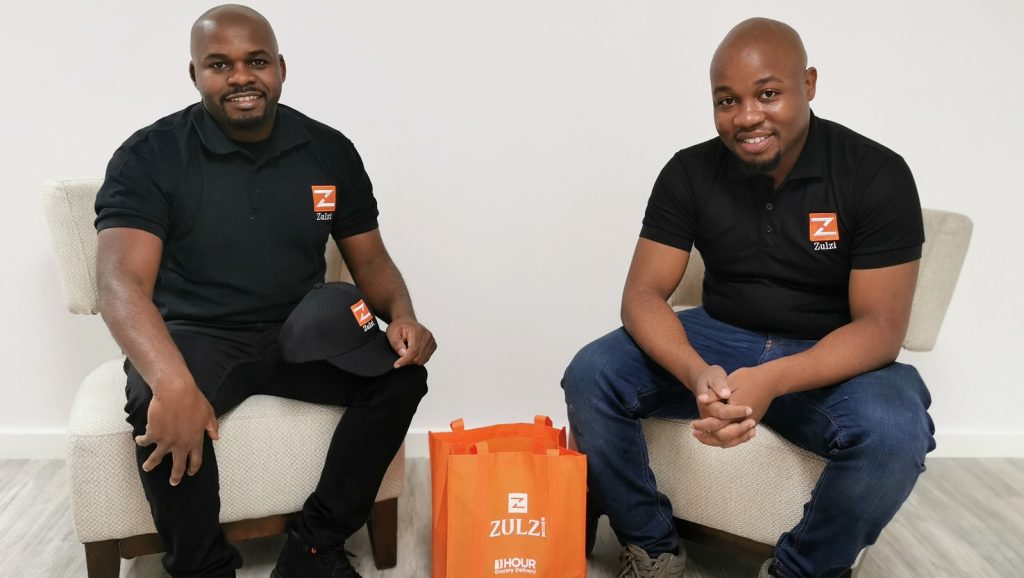Have you ever wondered how much easier travel has become, thanks to the digital innovations shaping our world? Exploring new destinations used to mean…
SA grocery delivery startup Zulzi raises R30m from JSE-listed company

Johannesburg based online grocery delivery startup Zulzi has raised R30-million from a JSE-listed company.
The startup, which was founded by Vutlharhi Valoyi (pictured above, right with co-founder Michael Netshipise) in 2013 and launched in 2016, allows members via its platform to get direct access to thousands of grocery items through a mobile app. Netshipise joined as co-founder CTO after the launch of the Zulzi’s platform.
Similar to startups like Cape Town based OneCart, the app allows customers to build their grocery lists and purchase items without ever visiting a store. Trained shoppers then handpick and deliver the items, transforming the grocery shopping experience.
Zulzi was founded by Vutlharhi Valoyi and Michael Netshipise
Valoyi, who made the announcement on Twitter last week, confirmed the investment in a call with Ventureburn today.
However, he would not name who the investor is, other than to say that it is a listed company and that the investment was concluded in March, just before South Africa’s Covid-19 lockdown commenced on 27 March. The money only landed in the startup’s account last week, he added.
He revealed that negotiations with the investor began in December, adding that the startup had already received approaches from a number of investors. But he said the startup went with the listed company because “the interest was always there”.
Work for Checkers Sixty60 app
While he would not say who the investor is, Valoyi did reveal that the startup was behind the development of Checkers’ Sixty60 app.
He said the development work, which was completed last year, helped to bring cash into the business, while the business was growing.
And grow it has. Valoyi claims that the startup’s app has now been downloaded 100 000 times since its launch. The startup currently services Pretoria, Johannesburg, Cape Town and Durban.
The company he says is now processing about 2000 orders a day (70% of these in Gauteng) and that in March it did R1-million in sales a day, up six times over the same period in 2019.
About 99% of the startup’s orders are concluded via the mobile app, and just 1% are made on the web app, said Valoyi.
Today the business has a team of 35, including eight developers.
The startup previously netted a R2-million investment from IDF Capital in 2017 and Valoyi said the startup last year bought out IDF Capital’s stake.
However, commenting in an email subsequent to the publication of this story, IDF Capital’s CEO Polo Leteka said the fund had not “fully exited” its R2-million investment in Zulzi. “We did a part-exit last year some time though,” she explained.
From secondhand books to big money
Valoyi, who is originally from Giyani in Limpopo province, says it all started after he began working at a bank. Looking to make some extra money, he began selling secondhand books.
Things were going well so he formalised it into a business and began also selling electronic equipment. He then added other items such as food delivery and groceries.
Netshipise, a former colleague of Valoyi’s at FNB where the two previously worked, closed his analytics business and joined Valoyi when he launched the platform.
The business turned R5-million in revenue in its first year. “That encouraged me, that this online thing can work,” Valoyi recalls now.
In 2017 he dropped food delivery because of the high competition he faced from more established players and pivoted the business to focus on offering grocery delivery only.
But he soon discovered that grocery delivery has particular challenges that other types of deliveries don’t.
Often goods can go out of stock without any notice. To get around this he added a real-time messaging solution on the app so that shopper assistants who work for the startup can communicate directly with a customer.
The startup charges a service fee that ranges from 0% to 12.5%, depending on who the retailer is. In addition, a flat fee of R45 is levied on deliveries. Deliveries are limited to within a 6km radius of the nearest grocery retailer.
For Valoyi and Netshipise it all must feel like a dream come true, testament again that opportunity does exist even in trying times such as these.
*Correction: Zulzi CEO Vutlharhi Valoyi initially said that IDF Capital invested R1-million in Zulzi, but the fund’s CEO Polo Leteka confirmed subsequent to the publication of this story that it was in fact R2-million.
While Valoyi said his startup had last year bought out IDF Capital’s stake, Leteka confirmed that the fund had not “fully exited” its R2-million investment in Zulzi. “We did a part-exit last year some time though,” she explained. The story has been amended to reflect this.
Featured image: Zulzi co-founders Michael Netshipise and Vutlharhi Valoyi (Facebook)

